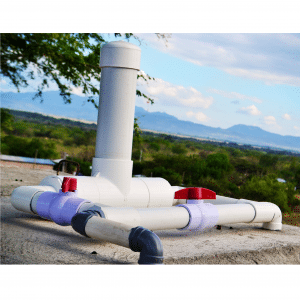
Agriculture
January 2, 2024
CTI Water Chlorinator
Read SolutionImplemented by
Bountifield
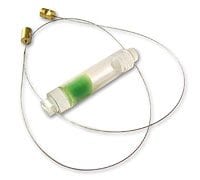
Updated on January 3, 2024
·Created on August 9, 2017
A wax-actuated thermometer that indicates when water has reached pasteurization temperature.
The Water Pasteurization Indicator (WAPI) is an open-source hand-made thermometer that indicates when water has reached pasteurization temperature and is safe to drink. Rather than waiting for water to boil (which occurs at 100 °C and is far beyond the required temperature for destroying microorganisms), a WAPI uses a melting wax to indicate that water has reached 65 °C. This saves fuel by eliminating the need to boil water to ensure that the pasteurization temperature has been reached.
Target SDGs
SDG 6: Clean Water and Sanitation
SDG 3: Good Health and Well-Being
Market Suggested Retail Price
$10.00
Target Users (Target Impact Group)
Household
Distributors / Implementing Organizations
Many organizations have made and distributed WAPIs including Agua Pura Para el Pueblo and Rotary International Clubs (such as Buford/North Gwinnett, Calabasas, and Monterey Sunrise).
Regions
Worldwide
Manufacturing/Building Method
WAPIs are built using openly available instructions that require the following materials: Polycarbonate tubing (3/8” OD, 1/4” ID), wax (Myverol 18-06), a washer (18-8ss, 1” OD, 3/8” ID), 2 single barrel compression sleeves, and a wire “S” hook.
Intellectural Property Type
Open-source
User Provision Model
Construction manuals and instructional videos for building WAPI’s are openly available online. Links can be also be found in Research & standards section.
Distributions to Date Status
Unknown
Deactivation mechanism
Pasteurization
Energy source
None
Manufacturer-specified water treatment rate (L/hr)
Not applicable
Bacteria reduction
6 log
Virus reduction
4 log
Protozoa reduction
Unknown
Heavy metals and/or arsenic reduction
Unknown
Maximum recommended influent turbidity level (NTU)
Not applicable
Effluent turbidity levels (NTU)
Does not reduce turbidity
Safe water storage capacity (L)
None
Design Specifications
A WAPI consists of Myverol 18-06 soy wax that is housed inside a sealed clear tube. When submerged in water with wire and washers, the wax will melt from one end of the clear tube to the other at 65 °C. WAPI’s are symmetrical and thus can be repeatedly used by simply flipping them over.
Technical Support
None available
Replacement Components
Components must be locally purchased
Lifecycle
Unknown
Manufacturer Specified Performance Parameters
Wax must melt at 65 °C.
Vetted Performance Status
Water pasteurization is well known to be effective against microorganisms (bacteria, viruses, and protozoa). Specifically, the WAPI has been used by academic organizations to test water pasteurization in low-resource situations.
Safety
Treated water should be stored in a clean container to avoid recontamination. Pasteurization does not treat water contaminated with salt or other chemicals.
Complementary Technical Systems
Solar or biomass-powered pasteurization.
Academic Research and References
Rolla, T.C., Sun and water: an overview of solar water treatment devices, Journal of Environmental Health, 1998, 60(10).
Metcalf, Robert, “The microbiology of solar water pasteurization, with application in East Africa” a report by WAPI designer.
Safapour, N., Metcalf, R.H., Enhancement of solar water pasteurization with reflectors, Applied and Environmental Microbiology, 1999, 65(2), 859-861. (this study uses the WAPI as an indicator for pasteurization)
Solar Pasteurization, A chapter in Drinking Water Treatment by Ed Pejack (pages 37-54)
Kang, G., Roy, S., Balraj, V., Appropriate technology for rural India – solar decontamination of water for emergency settings and small communities, Transactions of The Royal Society of Tropical Medicine and Hygiene, 2006, 100(9), 863-866.
N. Safapour and R. H. Metcalf, “Enhancement of solar water pasteurization with reflectors,” Appl. Environ. Microbiol., vol. 65, no. 2, pp. 859–861, 1999.
T. C. Rolla, “Sun and water: an overview of solar water treatment devices,” J. Environ. Health, vol. 60, p. 30+, 1998.
“WAPI Flyer,” Monterey Peninsula Sunrise Rotary Club. Available: http://www.montereysunriserotary.org/wapi-flyer.html
“Agua Pura para el Pueblo,” Aguapuraparaelpueblo.org. Available: https://www.aguapuraparaelpueblo.org/
“Water Projects,” FFYIA. Available: https://www.florenceforyouthinaction.org/waterprojects
“Water Pasteurization Indicator (WAPI),” Engineering For Change. Available: http://old.engineeringforchange.org/solutions/product/water-pasteurization-indicator-wapi/
“Multi-Fuel Water Pasteurization Indicator (WAPI),” Sun Oven The Original Solar Oven and Solar Cooker, 29-Apr-2020. Available: https://www.sunoven.com/product/water-pasteurization-indicator-wapi/
“Goal 6,” Sdgs.un.org. Available: https://sdgs.un.org/goals/goal6
“Agua Pura para el Pueblo,” Aguapuraparaelpueblo.org. Available: https://www.aguapuraparaelpueblo.org/?p=663
“Water Pasteurization Indicator,” Solar Cooking. Available: https://solarcooking.fandom.com/wiki/Water_Pasteurization_Indicator
“What is a Wapi or Water Pasteurization Indicator?,” Write Studio, 08-Oct-2012. Available: https://www.writestudio.com/304/water-pasteurization-indicator
“The microbiology of solar water pasteurization, with applications in east Africa,” Nocookie.net. Available: https://static3.wikia.nocookie.net/__cb20101207224924/solarcooking/images/a/a0/Granada06_robert_metcalf.pdf
Compliance with regulations
Pasteurizing water can reduce microorganism concentration to levels recommended by the WHO.
Evaluation methods
WAPIs have been evaluated and shown to reduce microorganism concentrations when the wax melts at 65 °C. Additional field tests and user reports have shown their durability and usability.
Other Information
None

Agriculture
January 2, 2024
Implemented by
Bountifield
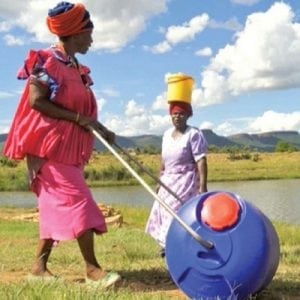
Agriculture
June 22, 2024
Implemented by
Hippo Roller
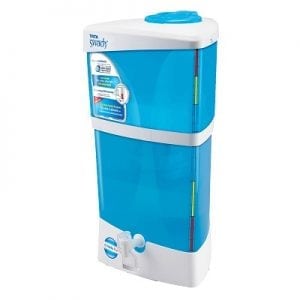
Agriculture
January 1, 2024
Implemented by
TATA Swach
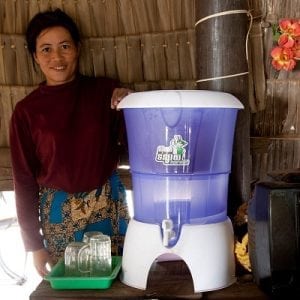
Agriculture
January 4, 2024
Implemented by
iDE
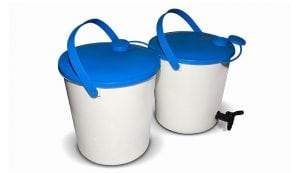
Agriculture
January 10, 2024
Implemented by
NRSRelief

Agriculture
January 24, 2024
Implemented by
AidGear
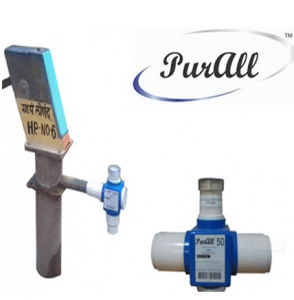
Agriculture
January 3, 2024
Implemented by
Easol Pvt Ldt
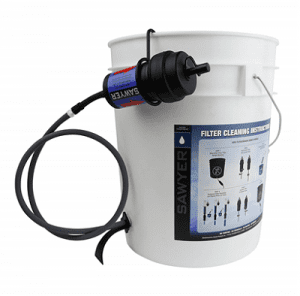
Agriculture
December 29, 2023
Implemented by
Sawyer
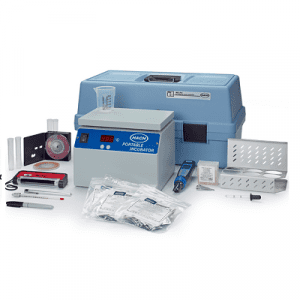
Agriculture
January 17, 2024
Implemented by
HACH
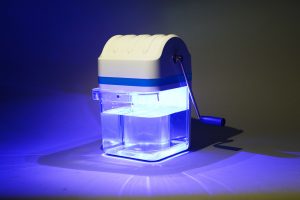
Agriculture
January 30, 2024
Implemented by
Puralytics
Have thoughts on how we can improve?
Give Us Feedback
It’s unclear to me how this product is intended to be used. Is it intended to be a stationary or mobile device? If it is a stationary device, what is the advantage of the GPS? This is probably a cool design feature but the value of it is not described anywhere. Is this cooler intended to be plugged into the wall the majority of the time with a battery backup? Is it powered by a solar panel? Is it completely passive where the ice packs are removed and frozen in an external freezer?
•Rebranded to Safe Water Book
•Also filtration? What is the primary mechanism – filtration or disinfection?
•How do you have a “user provision model” already if it’s still a prototype?
•Price not $0, not being sold yet
•Any information on flow rate through the book’s page?
Agree about confusion between filtration and disinfection as the method of treatment. It’s a little misleading to have this listed alongside disinfection products.